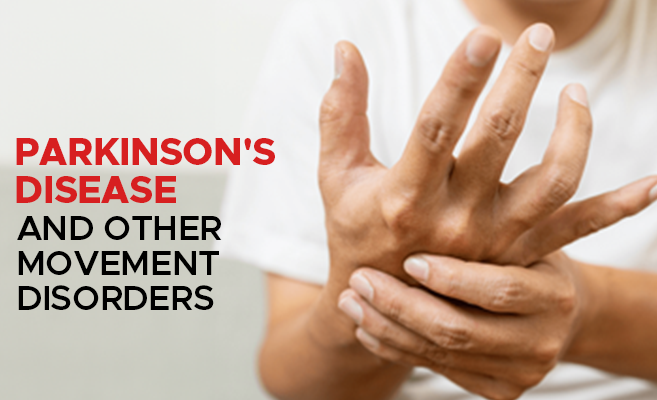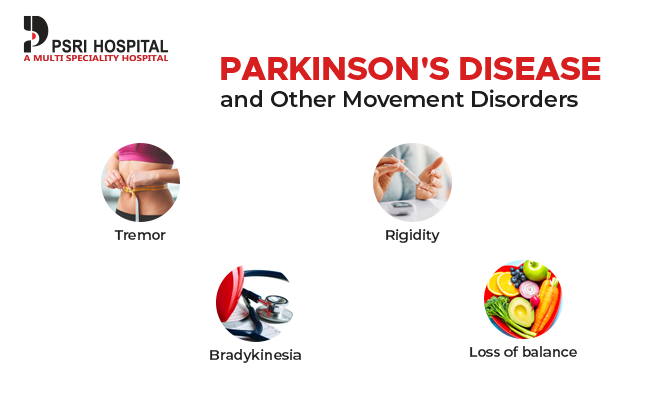Parkinson’s Disease and Other Movement Disorders

Have you ever noticed a slight tremor in your hand when drinking your morning coffee? Did your family mention your voice seems softer lately? These small changes may seem harmless at first. But they could signal something more serious—the early stages of Parkinson’s disease.
Movement disorders refer to a group of neurological conditions that affect a person’s ability to control their voluntary and involuntary movements. Some of the most common movement disorders include Parkinson’s disease, essential tremor, and dystonia. In this blog post, we will focus on Parkinson’s disease and provide an overview of its symptoms, causes, diagnosis, and treatment options.
What is Parkinson’s Disease?
Parkinson’s disease (PD) is a progressive nervous system disorder that impacts movement. It develops gradually, sometimes starting with a barely noticeable tremor in one hand. PD symptoms tend to worsen over time. The disorder stems from a loss of neurons that produce dopamine in the substantia nigra region of the brain. Dopamine helps transmit signals between the substantia nigra and an area involved in coordinating movement. As dopamine levels decrease, communication between these brain regions becomes impaired.
Early Symptoms of Parkinson’s Disease
The early symptoms of PD often go unnoticed. They may seem like normal age-related changes at first. Early signs can include:
- Subtle shaking or tremor in one hand
- Changes in handwriting with letters that are small or cramped
- Lack of arm swing when walking
- Soft or whispery speech
- Stooped posture
- Shuffling when walking or reduced arm swing
As the condition progresses, symptoms of Parkinson’s Disease often extend to both sides of the body and become more apparent. Typical motor symptoms include:

Non-motor symptoms of Parkinson’s Disease may include anxiety, irritability, memory problems, constipation, speech changes, and sleep disturbances. Symptoms and rate of progression can vary significantly among individuals. If you experience these symptoms, visiting the best neurologist in Delhi NCR is crucial.
Diagnosing Parkinson’s
There are no standard laboratory tests to diagnose PD. The best neurologist in Delhi NCR typically performs a medical history review and a thorough neurological exam. The doctor looks for classic PD symptoms like tremors and evaluates coordination, balance, and thinking ability.
They may also suggest brain scans to rule out other potential causes of symptoms. Definitively diagnosing PD sometimes takes multiple doctor visits and follow-up exams over time.
Treatment for Parkinson’s Disease
While there is no cure for Parkinson’s disease yet, there are treatment options to help manage symptoms. The main goals are to enhance mobility and functional ability while also addressing quality-of-life considerations. Common treatments include:
- Medications – Prescription drugs help restore dopamine levels or stimulate dopamine effects. Options like levodopa/carbidopa, dopamine agonists, MAO-B inhibitors, and other drugs can minimize symptoms of Disorder Disease, often dramatically so, at least for a period of time.
- Ongoing therapy – Physical, occupational, and speech therapy provides exercises, activity training, and targeted interventions to improve posture, balance, mobility, speech, swallowing, and activities of daily living. Therapy helps people better manage symptoms in day-to-day life.
- Deep brain stimulation – In advanced PD cases, deep brain stimulation requires surgically implanted electrodes to send electrical pulses to targeted areas involved in motor function. This can significantly improve problematic movement symptoms when paired with medications.
- Lifestyle modifications – Good self-care, like staying active, eating a balanced diet, practicing good sleep habits, and finding community support, can help maximize quality of life. Modifying the home environment to improve safety and accessibility can also help individuals remain independent longer.
Conclusion
While living with Parkinson’s Disease has many challenges, early intervention and integrated treatment support can make a positive difference for many years following diagnosis. Being attentive to emerging symptoms and seeking medical care are vital first steps toward gaining control over this complex disorder. With a proactive approach, patients have every opportunity to thrive while managing PD impacts.
So, if you are searching for the Best Hospital in India for International Patients, PSRI Hospital is here to help. We have the best neurologist in Delhi NCR who has years of experience in treating your health problems in the most suitable way. Book an appointment now to know more.
FAQs
What are the early warning signs of Parkinson’s disease?
Some early signs of Parkinson’s include a slight tremor or shaking in one hand, changes in handwriting, reduced arm swing when walking, soft or slurred speech, rigidity or stiffness in the limbs or trunk, and general slowness of movement.
What causes Parkinson’s and other movement disorders?
In Parkinson’s, dopamine shortages in one specific basal ganglia region—the substantia nigra—are primarily at fault. Dopamine regulates signals between the substantia nigra and cerebral cortex that help plan and execute smooth movements.
How are movement disorders diagnosed?
There are no definitive tests for most movement disorders. Doctors typically do a full medical history and thorough neurological examination to check motor coordination, movement patterns, slowness, tremors, stiffness, balance, gait, and more.
What treatments are available for Parkinson’s disease?
Common Parkinson’s disease treatments include prescription medications, ongoing physical, occupational, and speech therapies, targeted deep brain stimulation, and lifestyle changes to promote better overall health.

 Book An Appointment
Book An Appointment Virtual Consultation
Virtual Consultation




